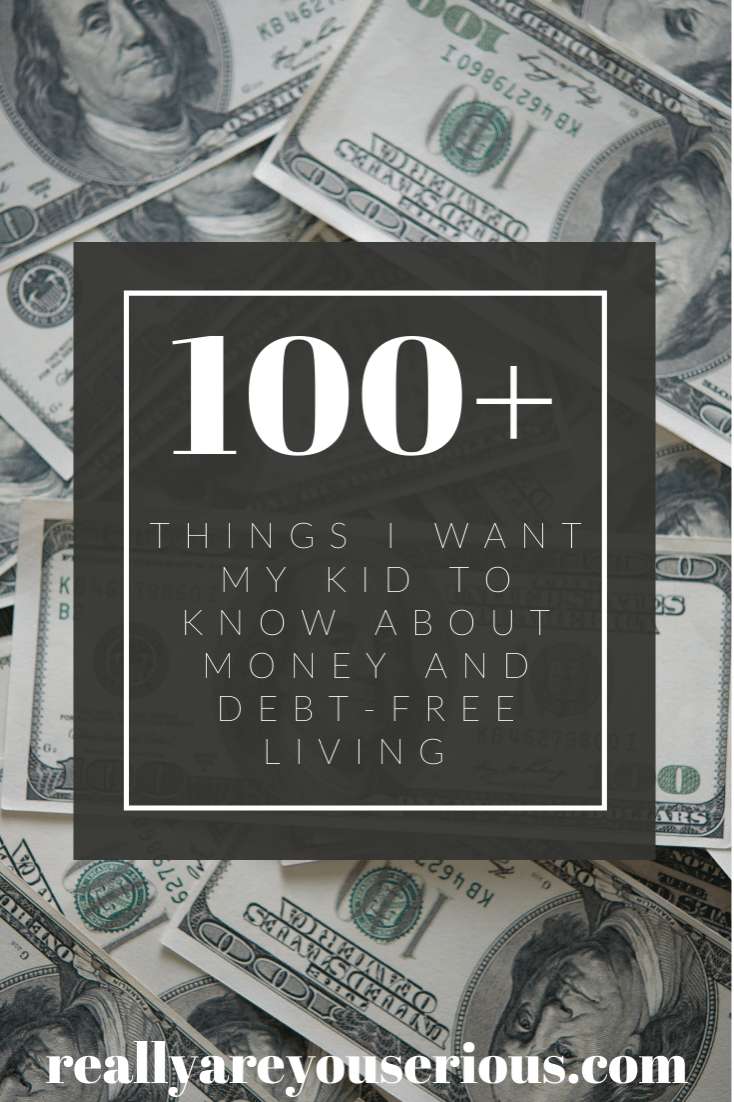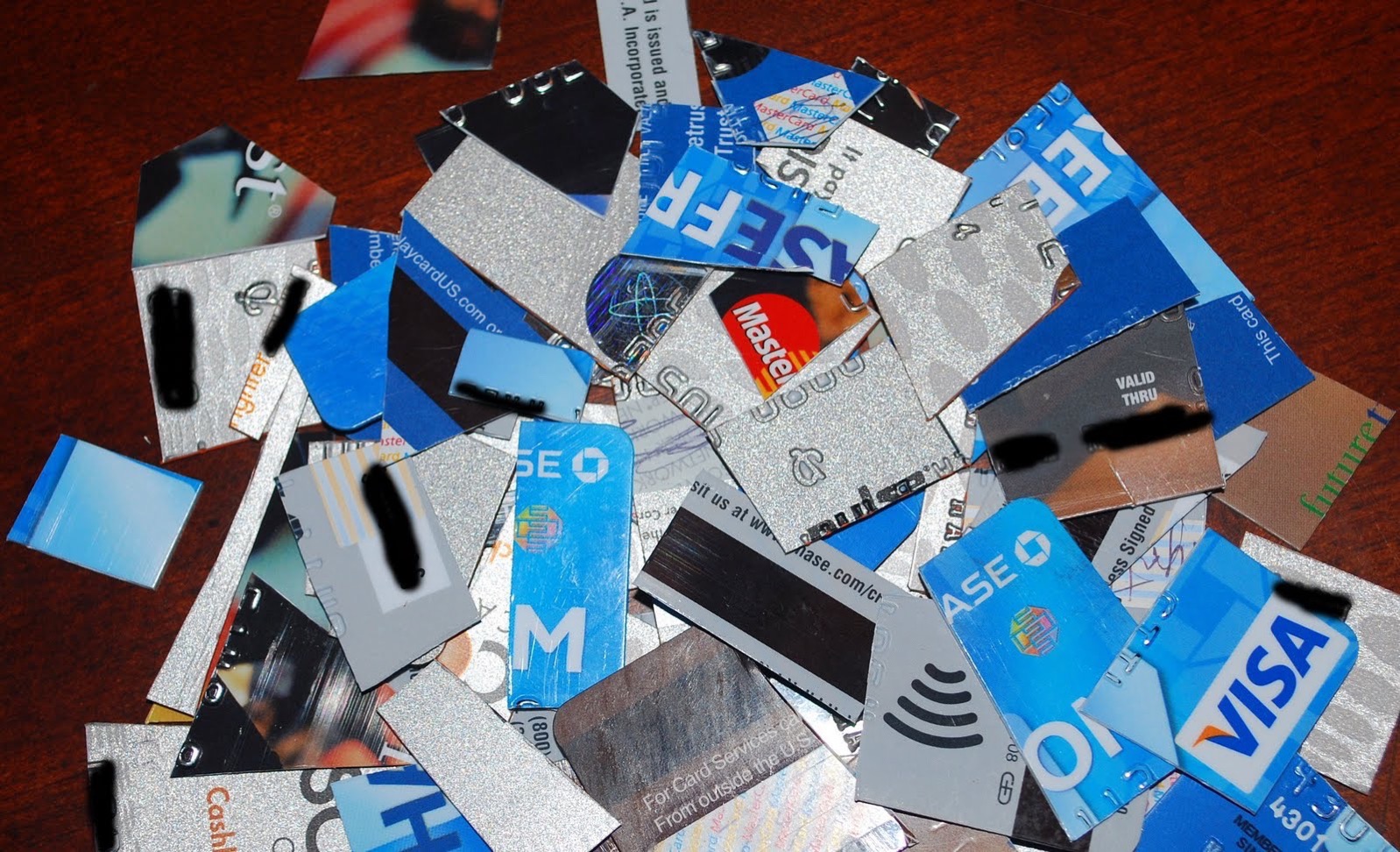100+ things I want my kids / everyone to know about money and debt-free living
Can we all agree that debt is overwhelming? It was draining us every month and making us very stressed out. By the end of reading this list of 100+ things I want my kids / everyone to know about money and debt-free living, I hope you too are inspired to take a look at your financial situation and make some decisions with your family and / or yourself. And possibly, start your own debt-free journey. Let’s be weird together!

I want to go there with you. I hope you will read this whole list and ask any questions you might have. Over 10 years ago, Mr. Serious and I decided to get right with our spending and budgeting and debt. We read Total Money Makeover and started a zero balance budget the next weekend. Through lots of hard work, sacrifice and dedication, we cut up our credit cards, paid off all of our debt (which was composed of student loans, a van, and a second mortgage), switched to a cash envelope spending system, carried on with the Dave Ramsey baby steps and finally paid off our house completely (that’s a fun video…you should watch it) in January 2018.
Since starting our journey, we’ve taught numerous classes at our church and helped other people and families become debt-free. Through those, we’ve learned a lot and wanted to share 100+ things I want my kids / everyone to know about money and debt-free living.
Tools to help
- Financial Peace University
.
- Total Money Makeover
.
- Every Dollar Budgeting App.
- Paper and pencil.
- Calculator
.
- Google drive spreadsheet or excel spreadsheet.
- An open mind.
Just starting
- No better time to start then now.
- You are starting this journey because you know something needs to change.
- It’s never too late to make progress.
- Know your WHY. Repeat it daily!
- Be okay with talking to yourself out loud. “Do I really need this? NO!”

Changing your mindset
- Once you realize what your goal is and see it (no debt), you can do hard things.
- You will have to change your habits.
- Habits CAN be changed.
- You don’t have to get a fancy coffee on the way to work everyday.
- What’s your why? It’s a powerful motivator.
- If you keep your current financial habits, where will you be in 5, 10, or 20 years?
Budgeting
- You budget to tell your money where it’s going to go, not where it went.
- Decide how often you will budget…monthly, weekly, bi-weekly, etc. Do what works for you and your income and spending.
- Start with paper and pull out all of your bank statements and bills from the past couple months.
- Use an app or google spreadsheet that’s easy to update and copy for the next month.
- Know all of the categories you will have tor spending (utilities, mortgage/rent, grocery store, going out to eat, reoccurring bills, etc).
- Plan for it to take a few hours.
- Then add a couple more hours to it.
- Know that you’ll probably need an emergency budget meeting at least once during the month to make changes for things that “pop up.”
- Holidays, birthdays, etc. aren’t emergencies. Look at the calendar and budget for them.
- Don’t let annual or quarterly bills derail you – budget for them all in the month they’re due, or accrue for them monthly. Just pick.
- Your first budget will suck, but you’ll get better.
- Do you really need all of those sports cable channels? Call your provider and change your service or try to get a better deal.
- Are you using your cell phone plan to its full potential? See above!
- Give yourself “blow” money.
- Understand that your budget can and will be fluid.
- Once you have a budget, it should end with a zero balance aka, not having extra money (tell it where to go if you do) and not having a negative balance (which means more debt).
Starting that Emergency Fund ($1000 savings)
- Find things to sell, especially around your house. Don’t try to get top dollar for it, get what it’s worth and move on.
- Have a garage sale.
- Check around for cash you already have.
- Look at random investments you might have started (not looking at retirement or 401K) and see if you have money sitting in something you can cash out.
- Check your budget for wiggle room. Can you cut your grocery budget? Not go out to eat? Go longer without a haircut? Not buy something for a month? Cut coupons?
- Cash in that change jar. Look in the car and couch for random change. Find a penny, pick it up.
- Grab a second job; mow lawns, tutor kids, work at a store.
Tips for saving money
- Have you created a budget with a zero balance?
- Food is a big expense, can you cut that down so you can start to save money?
- Stop going out to eat or grabbing a quick bite in a drive through.
- You are going to be a weirdo.
- Many things that cost money can be negotiated. Attempt to negotiate things like car and home insurance.
- Make a change jar and put your change from purchases into a jar.

Switching to cash
- Cut up your credit cards. Yes, seriously. Do it.
- Start the transition to cash: weekly, monthly or pick a category that would that you can only use cash for and go from there.
- Get cash from the bank at your desired increments.
- Use envelopes with actual cash in them.
- Envelopes can be free! I use the envelopes we get from our bank with cash in them and write the category on the top with a marker.
- Bring your cash with you when you go shopping or out, your debit card or a credit card isn’t a “back up.”
- Cash hurts…you can feel it!
- Feel proud knowing you are spending money you actually HAVE!

On Credit Cards and Credit
- To have a credit score, you need to have debt.
- If you have no debt, your credit score is 0. This isn’t a bad thing.
- Not using credit cards is okay.
- Not HAVING a credit card is okay.
- Credit card companies WANT you to have credit cards. They will try to give you prizes and rewards to get them.
- You can tell credit card companies no!
- You don’t need an emergency credit card.
- You CAN rent a card without a credit card.
- You CAN go on vacation without a credit card.
- You CAN get a hotel room without a credit card.
- You should have a debit card attached to your bank account.
- You can decide to give things up…if you have a rent to own, you can forfeit it and save the monthly payment. (Of course, there are terms, check them!).
- The credit card points aren’t worth it – you’ll spend more with credit.

Paying off debt
- Okay, so you’ve got some debt (maybe a car, maybe you signed up for a credit card or you did get student loans. Let’s go through paying those off.
- Make a list of all of your debt. Yes, all of it!
- Put that debt in order from smallest to biggest debt (not interest rate).
- Pay at least the minimum to everything, and put anything extra from the budget towards the debt at the top. Once that debt is paid off, you apply all of that money to the next bill and so on until it’s all gone.
- You can pay it off and get out of this, and you will feel free.
Buying things while trying to pay off debt and save money
- You can buy things and do things during your budgeting and paying off debt time.
- When you make purchases, it does delay paying off debt.
- The quicker you pay off your debt, the less stressful those experiences are “things” purchases will be.
- A new car isn’t a thing you should buy while trying to pay off debt and / or save money. In fact, buying a brand new car is something very few people should do because of the loss in value.
On Going to College / The Future
- You can go to college without debt.
- You don’t have to go to college.
- Plan to have a college fund for each kid.
- Hope they don’t use it because of scholarships and grants.
- When the time comes, plan to apply for a ton of scholarships and grants! Get that money!
- Being an apprentice and learning a skill has huge value.
- What’s the Return on Investment (ROI) for your degree? Is it worth it?
Insurance
- You need insurance, but not all insurance is worth it.
- Insurance transfers your financial risk to someone else, for a price.
- Insurance must haves: Medical, Life, Long-term Disability, Auto, Homeowners/Renters.
- Check your liability coverage for your auto insurance. You probably don’t have enough.
- Call your insurance company and renegotiate your policy or price it out with a new company.
- Never buy: Whole Life, AD&D, Cancer/Hospital Policies e.g., AFLAC.

Getting your kids / family on board
- Have a family meeting and explain what you are doing.
- Tell them you WHY.
- Explain the envelopes to your kids and that once it’s gone, it’s gone.
- Have them help you with the grocery list.
- Start showing them bills and how much things cost.
- If they worry about you having an “emergency credit card,” explain how you have an emergency fund and why you won’t have an emergency credit card.
- Get comfortable explaining what it means to you to be debt-free and why you want to do it.
Planning for retirement
- Planning for retirement is a big deal. You will retire. You want to make sure you are set for it.
- This, of course, comes after your emergency fund is funded and debt is paid off.
- Be aware of what your employer donates or matches.
- If you are self employed, you still need to plan for your retirement.
- This is where you get to dream big and make things happen.
Why I think it’s important to be debt-free
- Debt can be debilitating.
- Debt takes away a lot if not all of your financial freedom.
- Not having debt allows you to be generous and giving.
I feel like I could talk about being debt-free all day and twice on Sundays (sometimes I do), but it’s helpful to know what you need. How can I help you make the switch to cash and living a debt-free life?







Great article. We have been working to become debt free for a couple of years. Love Dave Ramsey!
We have no student loans, credit card debt, car loans, or mortgage. We do have some medical bills. We get one paid off and here comes another one. Working on paying off some other misc bills. Once those are paid the medical will be easier to deal with.
Thanks, Brenda!
That’s great that you don’t have anything but medical bills. I know those can be hugely overwhelming. I hope you can get on top of them and build up some savings!
Loving the list. With #56, you can avoid carrying the debt if you use a credit card for something simple and paying it off right away. Ie, gas, groceries, utility bills, etc.
Using a credit card and avoiding carrying the debt is of course an option. However, you can’t feel the cash leaving your hands. AND, you can use a debit card for gas. We’ve found that using cash for groceries and dining out, etc has substantially changed those spending habits. Additionally, when you use a credit card, you typically don’t see the charges right away and it can be harder to budget. Plus, it gives you a very easy out to not pay it if something “comes up.”
Helpful tips and ideas that parents can follow through. Thanks for it.